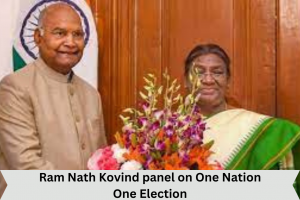ForumIAS announcing GS Foundation Program for UPSC CSE 2025-26 from 27th May. Click Here for more information.
Source: The post Kovind panel on One Nation, One Election has been created, based on the article “Ratification by states: What it will take to make One Nation One Election panel’s view legally tenable”published in “Indian express” on 15th March 2024.
UPSC Syllabus Topic: GS Paper 2- polity-Parliament and State Legislatures – structure, functioning, conduct of business, powers & privileges and issues arising out of these.
News: The article discusses a proposal by the Kovind panel for holding all elections in India together. This requires changing the Constitution and some laws. It suggests not all changes need state approval, but some legal experts might challenge this idea. Ram Nath Kovind panel on One Nation One Election
For details information on One Nation, One Election read here
What are the proposals of the Kovind panel on One Nation, One Election?
Simultaneous Elections: Proposes holding Lok Sabha, state assemblies, and local body elections together.
Constitutional Amendments: Recommends 15 amendments to the Constitution, altering and adding to various provisions.
Legal Changes for Union Territories: Suggests amendments to three statutes governing Delhi, Jammu and Kashmir, and other Union Territories.
Presidential Notification: A Presidential notification would set an “appointed date” for these simultaneous elections.
State Ratification Not Always Necessary: For syncing Lok Sabha and Assembly elections, state ratification isn’t required. However, for a common electoral roll and aligning local body elections with national polls, state approval is needed.
Constitutional Authority: According to the panel, the Constitution mainly entrusts Parliament, not states, with the power to conduct Assembly elections.
For For more information on Govt panel to study simultaneous polls read here
What are the challenges in implementing it?
1.Needs 15 constitutional amendments, which is a complex and lengthy legislative process.
2.Relies on a Presidential notification to set an election date, adding a procedural challenge.
3.Certain amendments require approval from half of the states, which might be difficult to achieve.
4.Judicial Review Possibility: Past examples, like the Kihoto Hollohan case, show that such significant legal changes can be subject to judicial scrutiny and potential overturning by courts.
Question for practice:
Discuss the potential challenges and legal hurdles in implementing the Kovind panel’s proposals for ‘One Nation, One Election’ in India.





